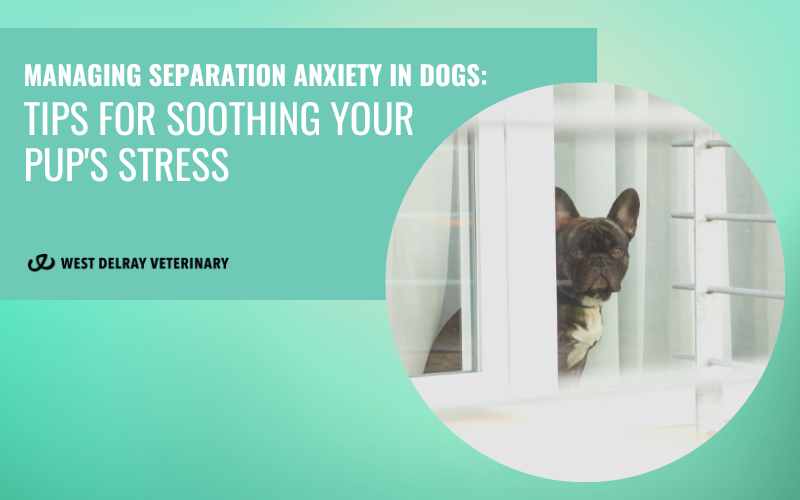As the back-to-school season approaches, families are gearing up for a fresh start with new routines and schedules. While this time of year brings excitement for students and parents alike, it can also mean a significant change in the daily lives of our beloved canine companions. With longer hours spent away from home, dogs may find themselves facing increased alone time, leading to potential separation anxiety. At West Delray Veterinary, we understand the importance of a seamless transition for both you and your furry friend. In this blog post, we’ll delve into effective strategies to help manage separation anxiety in dogs during the back-to-school season, ensuring a balanced and harmonious household.
What is Separation Anxiety?
Separation anxiety is a common behavioral issue in dogs, especially in those that have formed close bonds with their owners. When dogs are separated from their human family members, they can experience intense stress and fear, leading to various behavioral issues. These may include excessive barking, destructive chewing, house soiling, and attempts to escape.
Recognizing the Signs
Identifying separation anxiety in dogs is crucial for early intervention. Common signs to watch for include:
- Destructive Behavior: Dogs may chew furniture, shoes, or other household items when left alone.
- Excessive Vocalization: Persistent barking, whining, or howling is a sign of distress.
- Pacing and Restlessness: Dogs may constantly move around the house or exhibit signs of agitation.
- House Soiling: Accidents in the house, even if the dog is otherwise house-trained.
- Escape Attempts: Dogs may attempt to escape through doors or windows to find their owners.
- Excessive Greeting: Overenthusiastic greetings upon the owner’s return, even after a short absence.
Effective Strategies to Manage Separation Anxiety
- Gradual Departures and Arrivals: Make your comings and goings low-key to reduce excitement and anxiety. Gradually increase the time you spend away from your dog to acclimate them to longer periods alone.
- Create a Safe Space: Designate a comfortable area for your dog while you’re away. Provide toys, treats, and familiar scents to make it a positive and calming environment.
- Interactive Toys: Engage your dog with puzzle toys or treat dispensers to keep them mentally stimulated and distracted from your absence.
- Desensitization: Practice short absences regularly and gradually increase the duration. This helps your dog learn that you will return and that being alone is safe.
- Calming Supplements or Medication: Consult with your veterinarian about the potential benefits of natural calming supplements or medication for severe cases.
- Positive Reinforcement: Praise and reward your dog for calm behavior during departures and arrivals.
- Trainers and Veterinary Behaviorists: Trainers and veterinary behaviorists play a vital role in alleviating separation anxiety in pets by implementing personalized behavior modification plans and providing guidance to pet owners on gradual desensitization techniques and positive reinforcement strategies.
Separation anxiety is a challenging issue that requires patience, understanding, and a well-thought-out plan. At West Delray Veterinary, we know how much your four-legged friend means to you, and we are committed to helping you navigate through this. By implementing the strategies mentioned above and seeking professional guidance when needed, you can manage separation anxiety and build a stronger, happier bond with your canine companion. Remember, you’re not alone in this journey; we are here to support you every step of the way.
If you are located in the Delray Beach, Boynton Beach, or Boca Raton area and are interested in scheduling an appointment for your fur baby with one of our AMAZING veterinarians, please feel free to contact the team at West Delray Veterinary at 561-777-7173 or visit our website.

